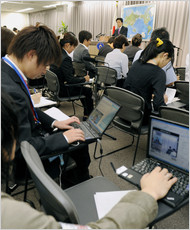The dynamic of openness of press and speech in China can be best observed at the grassroots level as the public expresses itself via critical incidents. The government may wish to suppress reporting but if something resonates with public grievances, it simply will not be completely successful given the technology of new media. The case of a girl killed by a reckless driver, the son of a powerful official illustrates this phenomenon, as reported below in the Times this week:
In many ways, the Li Gang case, as it is known, exemplifies how China’s propaganda machine — able to slant or kill any news in the age of printing presses and television — is sometimes hamstrung in the age of the Internet, especially when it tries to manipulate a pithy narrative about the abuse of power.
The ability of the public to push for greater openness in spite of official efforts to the contrary (still not to be underestimated) is an often overlooked reason for optimism. Doctoral candidate Jia Dai in the School of Journalism is in the process of analyzing a series of similar events for their reflection of deliberative quality.






more hiring in investigative journalism
October 19, 2010The Center for Public Integrity will merge with a Huffington Post operation to create a larger news organization for investigations. That sounds like good news for the muckraking tradition:
Posted in news & comment, trends in news | Leave a Comment »